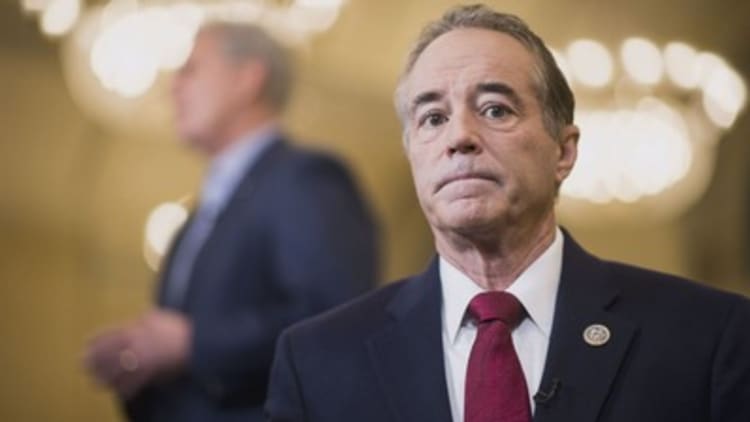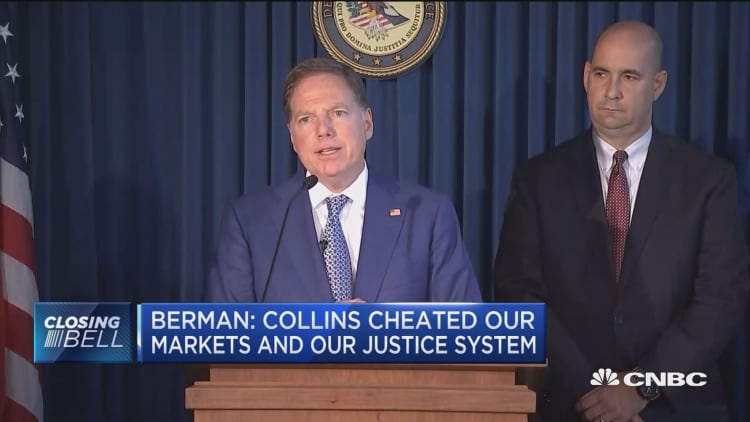
Rep. Chris Collins, R-N.Y., used campaign funds to pay legal bills while he faced investigation for alleged insider trading for more than a year.
A federal criminal investigation culminated in his arrest Wednesday, but before that he was under scrutiny by congressional ethics investigators.
Federal prosecutors in the Southern District of New York allege that Collins, while he was a board member of Australian company Innate Immunotherapeutics, gave a tip to his son Cameron last year about a failed drug trial that would soon be announced. His son used that information to dump the stock and avoid a six-figure loss, the Justice Department alleges, and Cameron Collins passed that information along to his father-in-law.
The two men were charged along with Collins. All three pleaded not guilty.
Since July 2017, Federal Election Commission records show Collins' campaign has been paying up to $60,000 per month in legal services to prestigious law firm BakerHostetler. The firm is representing Collins in the case.
While it is legal to use campaign funds to pay for legal fees, it's not clear whether Collins' constituents and supporters were aware that donations were being used to assist his legal fight.
These legal fees covered the time period of two separate House probes, including one by the Office of Congressional Ethics and another by the House Ethics Committee.
A spokesman for the Collins legal team confirmed that the payments from the campaign were for the investigation by the nonpartisan Office of Congressional Ethics and an ongoing inquiry by the House Ethics Committee. Going forward, the congressman will pay for his legal bills out of his own pocket, the spokesman added.
A spokesperson for the Collins campaign did not return a request for comment. Collins retired from Innate's board in early May 2018.
Covering multiple inquiries
The payments coincide with multiple inquiries into Collins' alleged insider trading scheme.
The first $45,000 payment to the firm came in July 2017, just before the OCE referred its analysis to the House Ethics Committee, the governing body that is charged with following up on the OCE's claims.
At the time, the OCE announced it had "a substantial reason to believe that Collins shared material nonpublic information in the purchase of Innate stock."
The announcement came just weeks after the alleged phone call Collins made to his son during the congressional picnic at the White House. During the call, Collins allegedly told his son to trade his stock immediately after he received an email from Innate's CEO describing the results of the failed drug trial.
After the referral to the House Ethics Committee, Collins appeared to rev up his defense. From August through September of last year, his campaign made four payments to BakerHostetler totaling more than $115,000.
In October, the House Ethics Committee announced it had extended its review of Collins but declined to provide an end date to the investigation.
Collins' campaign paid for legal services as recently as June 2018, with the law firm receiving in excess of $85,000 so far this year. The most recent payment came on June 9 for $28,000.
Prosecutors' case a 'slam dunk,' experts say
White-collar crime experts said that the evidence against Collins is immense, and that he could be on the verge of facing extreme legal punishment for his actions.
"It appears from the indictment that this is a slam dunk for the prosecutors," said Nick Gravante, a white-collar defense attorney at Boies Schiller Flexner in New York. "The fact that you had this email from the CEO to the board and then apparently calls immediately thereafter from the congressman to his son and then a series of trades, including some from his son, to get rid of the stock before the news became public is a classic case of insider trading."
John Coffee, a Columbia Law School professor, said he believes there's a possibility that the only defense Collins may have is to claim that he told his son that the information he gave was confidential and that he was not permitted to disclose it.
"He could say he was gossiping with his kid and he told him to keep it confidential," Coffee said. "If you get a guarantee it will stay confidential, you can't disclose it. But that defense will put his son in prison and then you have in this case a possibility his son will go to jail."
For now, Collins is standing firm and refusing to resign. In a news conference on Wednesday, he called the charges against him "meritless." He said he intends to earn the voters' trust come this year's congressional midterm election.
Collins represents New York's 27th Congressional District. After his arrest, the nonpartisan Larry Sabato's Crystal Ball changed its rating from safe Republican to likely Republican.
Collins is currently facing off against Grand Island Town Supervisor Nate McMurray, a Democrat who's raised $133,624 through the election cycle. Collins is dominating the fundraising game so far, bringing in $1.2 million.
WATCH: Collins pleads not guilty to insider trading



